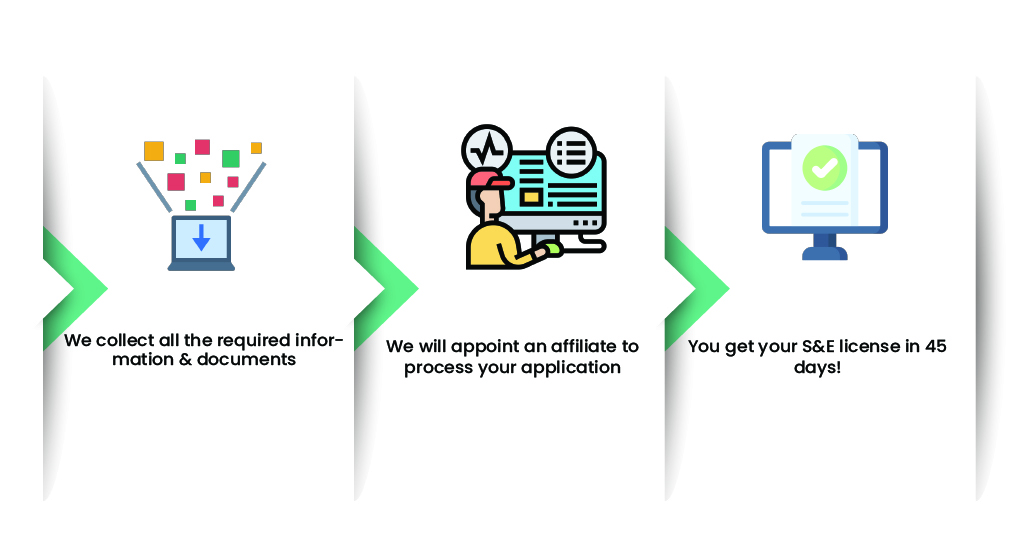
Get Your Shops & Establishments License Easily
Any business needs to be registered under your state's Shops and Establishments Act. With Finnsdom, get it done in the most hassle-free manner possible.
Get Your Shops & Establishments License Easily Steps

Get Your Shops & Establishments License Easily

Documents Required from Directors, Shareholders
- Pan Card Copy (Mandatory)
- ID Proof (Any one) – Driving License/ Voter ID/ Passport Copy/ Aadhaar Card
- Address Proof – Latest Bank Statement/ Latest Telephone or Mobile Bill/ Latest Electricity Bill.(MUST be less than 30 days old)
- Passport Size Photograph

Documents Required for Registered Office Address
- NOC – No Objection Certificate from the Owner of the Property
- Address Proof – Latest Telephone Bill or Mobile Bill/ Gas Bill/ Electricity Bill (MUST be less than 30 days old)
Shops & Establishments Act in India - an Overview
Finnsdom, your trusted legal advisor, provides a cost-effective company a Governed by the labour departments of each state, the Shops and Establishments Act institutionalized the ambience and the state of the work environment and also established the privileges employees are allowed by their company or the management. This is best suited for shops all across India, every benefit-making foundation, lodgings, bistros, eating circles and joints, eateries, cinemas, and for all public places of entertainment. It is a must for every establishment and foundation to enlist oneself within 30 days of commencing under this act irrespective of the business being fully functional or not. registration service in India. You may learn how to register your business here. We take care of all legal formalities and fulfill the compliances, as defined by the Ministry of Corporate Affairs. Post-approval of the company registration process, you receive a Certificate of Incorporation (CoI), along with PAN and TAN. Now, you can open a current bank account and begin your business operations.
Records to Be Maintained Under the Shops and Establishments Act
- Employee register and full details
- Payroll records – salary details, deduction, leave, overtime, fines, holidays, advance salaries
- Attendance
- All other details related to an employee
- All other allied registers.
Top 4 Features of the Shops & Establishments Act
The fundamental objective of the act:
One of the fundamental purposes behind the Shops and Establishments Act, thereby mandating establishment registration, is to make sure all employees are given equal rights and benefits in all foundations, be it the offices, movie theatres, or other places of entertainment.
The protocols of the Shops and Establishments Act and establishment registration:
The Shops and Establishments Act comes under the labour laws, and frames the rules for employers to carefully heed to the number of working hours day-by-day and consistently adhere to the stipulated times for opening and shutting establishments. It also requires the management to observe national and religious leaves, set guidelines for the enlistment of juveniles and women, leaves for maternity, and casual leaves.
Upkeep of records under the Shops and Establishments Act:
All organizations need to request for the approval or endorsement of the labour department and be up-to-date on the particulars of hiring, pay, credit reductions, leaves, and so forth, under the Shops and Establishments Act. Nevertheless, these guidelines may vary from one state to the other.
Authorise prerequisite for the Shops and Establishments Act & establishment registration process:
In accordance with the labour laws, a permit issued under the Shops and Establishments Act is an obligatory prerequisite and, along these lines, all shops and foundations should register under the Act within 30 days from the date of commencing operations.
Documents Required
- Shop or business address proof
- ID proof
- PAN card
- Payment challan
- Additional business licenses necessary to start a business.
Registration Process for Obtaining Shops and Establishments License
To register your shop or establishment online, follow the steps outlined below:
Step 1: Visit labour department website
The entire registration process takes place online in many states, while others are semi-online. Every state’s labour department has a website with an online registration form and instructions.
Step 2: Fill up application form
Fill out the online application form accurately with information about your business. Details differ depending on the state and type of company.
Step 3: Upload documents
After completing the form, upload the necessary documents online/ In few states, physical submission of documents and a printout of the application form is required.
Step 4: Fee payment
The fee varies depending on the type of company and the type of licence. Many states have an online payment option, but DD/cash payments may also be made offline.
Step 5: Inspection
The labour department examines your application and, if they believe an inspection of your business premises is required in order to verify the particulars you filled up and documents attached, an inspector might be appointed to carry out an inspection. In the majority of cases, Inspection is not required.
Step 6: Approval and issuance of license
Following a review of your application and/or a visit to your business location, the authorities approve your application and issue a valid licence (normally valid for 1 year with renewal every year).
Why Finnsdom?
- Our experts provide a detailed explanation about the registration process and required documentation.
- We prepare your application and work with you to gather all of the necessary employee and shop information.
- We process your shop registration and send it to the labour department, either online or in person, as required.
- We keep you updated on your status.
- Following acceptance, the shop licence certificate is sent via courier or in person.
Shop and Establishment Glossary
EPOS
EPOS is an abbreviation for electronic point of sale. Basically, any computerized system used to record sales and control inventory.
Private Label
These are brands owned not by a manufacturer, but by a retailer or supplier. Retailers and suppliers purchase the goods, then label and market them under their name.
Contactless Payments
This refers to a system of payments powered by near field communication (NFC).
They include NFC-enabled credit and debit cards, smart cards, and smartphones that allow customers to complete transactions without physically touching a payment terminal.
Get Started at
₹ 499/-
FAQs on Register & Set up Your Establishment
Yes. At Vakilsearch, the processing of your online application under the Shops and Establishments Act is filed on your behalf. All you have to do is give us the required information and the information required to enable us to file your application for you.
When you have a business, it is wise to register it and be licensed. This registration is vital, because the income you earn from your business cannot be shown as personal earnings. Further, the earnings from your business are taxable for the same. Additionally, it is illegal to be running a business without a business license.
There are two major pre-requisites for one to be able to become the applicant of trade shops and establishment license, they are:
- The person must have attained the age of 18 years and
- They must not have any criminal records in their name.
Every Indian state has passed rules and regulations governing working conditions. The aim is to ensure that workers employed in various institutions, such as stores, commercial establishments, residential hotels, restaurants, theatres, and other places of public amusement or entertainment receive uniform benefits.
Every shop and establishment needs to be registered under this Act within 30 days of commencement of work. As this is such a basic license, many other licenses require this as proof of a commercial business. For example, most banks will require you to furnish it if you want to open a current account.
If physical submission and/or departmental inspection of premises are required, it usually takes 15-20 days.
In the case of a completely online system, it can take up to three days in certain states.
To obtain state-specific information, contact Vakilsearch.

